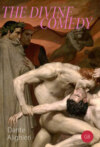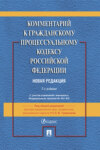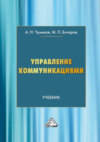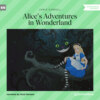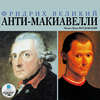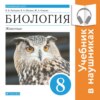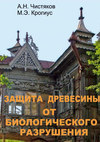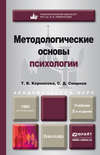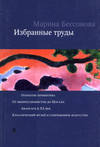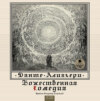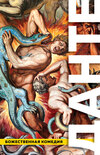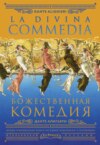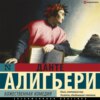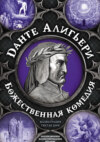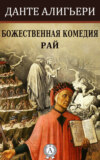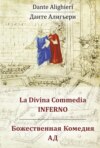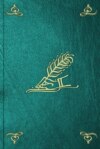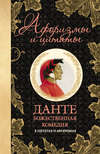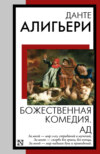Читать книгу: «The Divine Comedy», страница 2
Шрифт:
Canto V
From the first circle I descended thus
Down to the second, which, a lesser space
Embracing, so much more of grief contains
Provoking bitter moans. There, Minos stands
Grinning with ghastly feature: he, of all
Who enter, strict examining the crimes,
Gives sentence, and dismisses them beneath,
According as he foldeth him around:
For when before him comes th' ill fated soul,
It all confesses; and that judge severe
Of sins, considering what place in hell
Suits the transgression, with his tail so oft
Himself encircles, as degrees beneath
He dooms it to descend. Before him stand
Always a num'rous throng; and in his turn
Each one to judgment passing, speaks, and hears
His fate, thence downward to his dwelling hurl'd.
“O thou! who to this residence of woe
Approachest?” when he saw me coming, cried
Minos, relinquishing his dread employ,
“Look how thou enter here; beware in whom
Thou place thy trust; let not the entrance broad
Deceive thee to thy harm.” To him my guide:
“Wherefore exclaimest? Hinder not his way
By destiny appointed; so 'tis will'd
Where will and power are one. Ask thou no more.”
Now 'gin the rueful wailings to be heard.
Now am I come where many a plaining voice
Smites on mine ear. Into a place I came
Where light was silent all. Bellowing there groan'd
A noise as of a sea in tempest torn
By warring winds. The stormy blast of hell
With restless fury drives the spirits on
Whirl'd round and dash'd amain with sore annoy.
When they arrive before the ruinous sweep,
There shrieks are heard, there lamentations, moans,
And blasphemies 'gainst the good Power in heaven.
I understood that to this torment sad
The carnal sinners are condemn'd, in whom
Reason by lust is sway'd. As in large troops
And multitudinous, when winter reigns,
The starlings on their wings are borne abroad;
So bears the tyrannous gust those evil souls.
On this side and on that, above, below,
It drives them: hope of rest to solace them
Is none, nor e'en of milder pang. As cranes,
Chanting their dol'rous notes, traverse the sky,
Stretch'd out in long array: so I beheld
Spirits, who came loud wailing, hurried on
By their dire doom. Then I: “Instructor! who
Are these, by the black air so scourg'd?” – “The first
'Mong those, of whom thou question'st,” he replied,
“O'er many tongues was empress. She in vice
Of luxury was so shameless, that she made
Liking be lawful by promulg'd decree,
To clear the blame she had herself incurr'd.
This is Semiramis, of whom 'tis writ,
That she succeeded Ninus her espous'd;
And held the land, which now the Soldan rules.
The next in amorous fury slew herself,
And to Sicheus' ashes broke her faith:
Then follows Cleopatra, lustful queen.”
There mark'd I Helen, for whose sake so long
The time was fraught with evil; there the great
Achilles, who with love fought to the end.
Paris I saw, and Tristan; and beside
A thousand more he show'd me, and by name
Pointed them out, whom love bereav'd of life.
When I had heard my sage instructor name
Those dames and knights of antique days, o'erpower'd
By pity, well-nigh in amaze my mind
Was lost; and I began: “Bard! willingly
I would address those two together coming,
Which seem so light before the wind.” He thus:
“Note thou, when nearer they to us approach.
“Then by that love which carries them along,
Entreat; and they will come.” Soon as the wind
Sway'd them toward us, I thus fram'd my speech:
“O wearied spirits! come, and hold discourse
With us, if by none else restrain'd.” As doves
By fond desire invited, on wide wings
And firm, to their sweet nest returning home,
Cleave the air, wafted by their will along;
Thus issu'd from that troop, where Dido ranks,
They through the ill air speeding; with such force
My cry prevail'd by strong affection urg'd.
“O gracious creature and benign! who go'st
Visiting, through this element obscure,
Us, who the world with bloody stain imbru'd;
If for a friend the King of all we own'd,
Our pray'r to him should for thy peace arise,
Since thou hast pity on our evil plight.
Of whatsoe'er to hear or to discourse
It pleases thee, that will we hear, of that
Freely with thee discourse, while e'er the wind,
As now, is mute. The land, that gave me birth,
Is situate on the coast, where Po descends
To rest in ocean with his sequent streams.
“Love, that in gentle heart is quickly learnt,
Entangled him by that fair form, from me
Ta'en in such cruel sort, as grieves me still:
Love, that denial takes from none belov'd,
Caught me with pleasing him so passing well,
That, as thou see'st, he yet deserts me not.
“Love brought us to one death: Caina waits
The soul, who spilt our life.” Such were their words;
At hearing which downward I bent my looks,
And held them there so long, that the bard cried:
“What art thou pond'ring?” I in answer thus:
“Alas! by what sweet thoughts, what fond desire
Must they at length to that ill pass have reach'd!”
Then turning, I to them my speech address'd.
And thus began: “Francesca! your sad fate
Even to tears my grief and pity moves.
But tell me; in the time of your sweet sighs,
By what, and how love granted, that ye knew
Your yet uncertain wishes?” She replied:
“No greater grief than to remember days
Of joy, when mis'ry is at hand! That kens
Thy learn'd instructor. Yet so eagerly
If thou art bent to know the primal root,
From whence our love gat being, I will do,
As one, who weeps and tells his tale. One day
For our delight we read of Lancelot,
How him love thrall'd. Alone we were, and no
Suspicion near us. Ofttimes by that reading
Our eyes were drawn together, and the hue
Fled from our alter'd cheek. But at one point
Alone we fell. When of that smile we read,
The wished smile, rapturously kiss'd
By one so deep in love, then he, who ne'er
From me shall separate, at once my lips
All trembling kiss'd. The book and writer both
Were love's purveyors. In its leaves that day
We read no more.” While thus one spirit spake,
The other wail'd so sorely, that heartstruck
I through compassion fainting, seem'd not far
From death, and like a corpse fell to the ground.
Canto VI
My sense reviving, that erewhile had droop'd
With pity for the kindred shades, whence grief
O'ercame me wholly, straight around I see
New torments, new tormented souls, which way
Soe'er I move, or turn, or bend my sight.
In the third circle I arrive, of show'rs
Ceaseless, accursed, heavy, and cold, unchang'd
For ever, both in kind and in degree.
Large hail, discolour'd water, sleety flaw
Through the dun midnight air stream'd down amain:
Stank all the land whereon that tempest fell.
Cerberus, cruel monster, fierce and strange,
Through his wide threefold throat barks as a dog
Over the multitude immers'd beneath.
His eyes glare crimson, black his unctuous beard,
His belly large, and claw'd the hands, with which
He tears the spirits, flays them, and their limbs
Piecemeal disparts. Howling there spread, as curs,
Under the rainy deluge, with one side
The other screening, oft they roll them round,
A wretched, godless crew. When that great worm
Descried us, savage Cerberus, he op'd
His jaws, and the fangs show'd us; not a limb
Of him but trembled. Then my guide, his palms
Expanding on the ground, thence filled with earth
Rais'd them, and cast it in his ravenous maw.
E'en as a dog, that yelling bays for food
His keeper, when the morsel comes, lets fall
His fury, bent alone with eager haste
To swallow it; so dropp'd the loathsome cheeks
Of demon Cerberus, who thund'ring stuns
The spirits, that they for deafness wish in vain.
We, o'er the shades thrown prostrate by the brunt
Of the heavy tempest passing, set our feet
Upon their emptiness, that substance seem'd.
They all along the earth extended lay
Save one, that sudden rais'd himself to sit,
Soon as that way he saw us pass. “O thou!”
He cried, “who through the infernal shades art led,
Own, if again thou know'st me. Thou wast fram'd
Or ere my frame was broken.” I replied:
“The anguish thou endur'st perchance so takes
Thy form from my remembrance, that it seems
As if I saw thee never. But inform
Me who thou art, that in a place so sad
Art set, and in such torment, that although
Other be greater, more disgustful none
Can be imagin'd.” He in answer thus:
“Thy city heap'd with envy to the brim,
Ay that the measure overflows its bounds,
Held me in brighter days. Ye citizens
Were wont to name me Ciacco. For the sin
Of glutt'ny, damned vice, beneath this rain,
E'en as thou see'st, I with fatigue am worn;
Nor I sole spirit in this woe: all these
Have by like crime incurr'd like punishment.”
No more he said, and I my speech resum'd:
“Ciacco! thy dire affliction grieves me much,
Even to tears. But tell me, if thou know'st,
What shall at length befall the citizens
Of the divided city; whether any just one
Inhabit there: and tell me of the cause,
Whence jarring discord hath assail'd it thus?”
He then: “After long striving they will come
To blood; and the wild party from the woods
Will chase the other with much injury forth.
Then it behoves, that this must fall, within
Three solar circles; and the other rise
By borrow'd force of one, who under shore
Now rests. It shall a long space hold aloof
Its forehead, keeping under heavy weight
The other oppress'd, indignant at the load,
And grieving sore. The just are two in number,
But they neglected. Av'rice, envy, pride,
Three fatal sparks, have set the hearts of all
On fire.” Here ceas'd the lamentable sound;
And I continu'd thus: “Still would I learn
More from thee, farther parley still entreat.
Of Farinata and Tegghiaio say,
They who so well deserv'd, of Giacopo,
Arrigo, Mosca, and the rest, who bent
Their minds on working good. Oh! tell me where
They bide, and to their knowledge let me come.
For I am press'd with keen desire to hear,
If heaven's sweet cup or poisonous drug of hell
Be to their lip assign'd.” He answer'd straight:
“These are yet blacker spirits. Various crimes
Have sunk them deeper in the dark abyss.
If thou so far descendest, thou mayst see them.
But to the pleasant world when thou return'st,
Of me make mention, I entreat thee, there.
No more I tell thee, answer thee no more.”
This said, his fixed eyes he turn'd askance,
A little ey'd me, then bent down his head,
And 'midst his blind companions with it fell.
When thus my guide: “No more his bed he leaves,
Ere the last angel-trumpet blow. The Power
Adverse to these shall then in glory come,
Each one forthwith to his sad tomb repair,
Resume his fleshly vesture and his form,
And hear the eternal doom re-echoing rend
The vault.” So pass'd we through that mixture foul
Of spirits and rain, with tardy steps; meanwhile
Touching, though slightly, on the life to come.
For thus I question'd: “Shall these tortures, Sir!
When the great sentence passes, be increas'd,
Or mitigated, or as now severe?”
He then: “Consult thy knowledge; that decides
That as each thing to more perfection grows,
It feels more sensibly both good and pain.
Though ne'er to true perfection may arrive
This race accurs'd, yet nearer then than now
They shall approach it.” Compassing that path
Circuitous we journeyed, and discourse
Much more than I relate between us pass'd:
Till at the point, where the steps led below,
Arriv'd, there Plutus, the great foe, we found.
Canto VII
“Ah me! O Satan! Satan!” loud exclaim'd
Plutus, in accent hoarse of wild alarm:
And the kind sage, whom no event surpris'd,
To comfort me thus spake: “Let not thy fear
Harm thee, for power in him, be sure, is none
To hinder down this rock thy safe descent.”
Then to that sworn lip turning, “Peace!” he cried,
“Curs'd wolf! thy fury inward on thyself
Prey, and consume thee! Through the dark profound
Not without cause he passes. So 't is will'd
On high, there where the great Archangel pour'd
Heav'n's vengeance on the first adulterer proud.”
As sails full spread and bellying with the wind
Drop suddenly collaps'd, if the mast split;
So to the ground down dropp'd the cruel fiend.
Thus we, descending to the fourth steep ledge,
Gain'd on the dismal shore, that all the woe
Hems in of all the universe. Ah me!
Almighty Justice! in what store thou heap'st
New pains, new troubles, as I here beheld!
Wherefore doth fault of ours bring us to this?
E'en as a billow, on Charybdis rising,
Against encounter'd billow dashing breaks;
Such is the dance this wretched race must lead,
Whom more than elsewhere numerous here I found,
From one side and the other, with loud voice,
Both roll'd on weights by main forge of their breasts,
Then smote together, and each one forthwith
Roll'd them back voluble, turning again,
Exclaiming these, “Why holdest thou so fast?”
Those answering, “And why castest thou away?”
So still repeating their despiteful song,
They to the opposite point on either hand
Travers'd the horrid circle: then arriv'd,
Both turn'd them round, and through the middle space
Conflicting met again. At sight whereof
I, stung with grief, thus spake: “O say, my guide!
What race is this? Were these, whose heads are shorn,
On our left hand, all sep'rate to the church?”
He straight replied: “In their first life these all
In mind were so distorted, that they made,
According to due measure, of their wealth,
No use. This clearly from their words collect,
Which they howl forth, at each extremity
Arriving of the circle, where their crime
Contrary in kind disparts them. To the church
Were separate those, that with no hairy cowls
Are crown'd, both Popes and Cardinals, o'er whom
Av'rice dominion absolute maintains.”
I then: “Mid such as these some needs must be,
Whom I shall recognize, that with the blot
Of these foul sins were stain'd.” He answering thus:
“Vain thought conceiv'st thou. That ignoble life,
Which made them vile before, now makes them dark,
And to all knowledge indiscernible.
Forever they shall meet in this rude shock:
These from the tomb with clenched grasp shall rise,
Those with close-shaven locks. That ill they gave,
And ill they kept, hath of the beauteous world
Depriv'd, and set them at this strife, which needs
No labour'd phrase of mine to set it off.
Now may'st thou see, my son! how brief, how vain,
The goods committed into fortune's hands,
For which the human race keep such a coil!
Not all the gold, that is beneath the moon,
Or ever hath been, of these toil-worn souls
Might purchase rest for one.” I thus rejoin'd:
“My guide! of thee this also would I learn;
This fortune, that thou speak'st of, what it is,
Whose talons grasp the blessings of the world?”
He thus: “O beings blind! what ignorance
Besets you? Now my judgment hear and mark.
He, whose transcendent wisdom passes all,
The heavens creating, gave them ruling powers
To guide them, so that each part shines to each,
Their light in equal distribution pour'd.
By similar appointment he ordain'd
Over the world's bright images to rule
Superintendence of a guiding hand
And general minister, which at due time
May change the empty vantages of life
From race to race, from one to other's blood,
Beyond prevention of man's wisest care:
Wherefore one nation rises into sway,
Another languishes, e'en as her will
Decrees, from us conceal'd, as in the grass
The serpent train. Against her nought avails
Your utmost wisdom. She with foresight plans,
Judges, and carries on her reign, as theirs
The other powers divine. Her changes know
None intermission: by necessity
She is made swift, so frequent come who claim
Succession in her favours. This is she,
So execrated e'en by those, whose debt
To her is rather praise; they wrongfully
With blame requite her, and with evil word;
But she is blessed, and for that recks not:
Amidst the other primal beings glad
Rolls on her sphere, and in her bliss exults.
Now on our way pass we, to heavier woe
Descending: for each star is falling now,
That mounted at our entrance, and forbids
Too long our tarrying.” We the circle cross'd
To the next steep, arriving at a well,
That boiling pours itself down to a foss
Sluic'd from its source. Far murkier was the wave
Than sablest grain: and we in company
Of the inky waters, journeying by their side,
Enter'd, though by a different track, beneath.
Into a lake, the Stygian nam'd, expands
The dismal stream, when it hath reach'd the foot
Of the grey wither'd cliffs. Intent I stood
To gaze, and in the marish sunk descried
A miry tribe, all naked, and with looks
Betok'ning rage. They with their hands alone
Struck not, but with the head, the breast, the feet,
Cutting each other piecemeal with their fangs.
The good instructor spake; “Now seest thou, son!
The souls of those, whom anger overcame.
This too for certain know, that underneath
The water dwells a multitude, whose sighs
Into these bubbles make the surface heave,
As thine eye tells thee wheresoe'er it turn.
Fix'd in the slime they say: 'Sad once were we
In the sweet air made gladsome by the sun,
Carrying a foul and lazy mist within:
Now in these murky settlings are we sad.'
Such dolorous strain they gurgle in their throats.
But word distinct can utter none.” Our route
Thus compass'd we, a segment widely stretch'd
Between the dry embankment, and the core
Of the loath'd pool, turning meanwhile our eyes
Downward on those who gulp'd its muddy lees;
Nor stopp'd, till to a tower's low base we came.
Canto VIII
My theme pursuing, I relate that ere
We reach'd the lofty turret's base, our eyes
Its height ascended, where two cressets hung
We mark'd, and from afar another light
Return the signal, so remote, that scarce
The eye could catch its beam. I turning round
To the deep source of knowledge, thus inquir'd:
“Say what this means? and what that other light
In answer set? what agency doth this?”
“There on the filthy waters,” he replied,
“E'en now what next awaits us mayst thou see,
If the marsh-gender'd fog conceal it not.”
Never was arrow from the cord dismiss'd,
That ran its way so nimbly through the air,
As a small bark, that through the waves I spied
Toward us coming, under the sole sway
Of one that ferried it, who cried aloud:
“Art thou arriv'd, fell spirit?” – “Phlegyas, Phlegyas,
This time thou criest in vain,” my lord replied;
“No longer shalt thou have us, but while o'er
The slimy pool we pass.” As one who hears
Of some great wrong he hath sustain'd, whereat
Inly he pines; so Phlegyas inly pin'd
In his fierce ire. My guide descending stepp'd
Into the skiff, and bade me enter next
Close at his side; nor till my entrance seem'd
The vessel freighted. Soon as both embark'd,
Cutting the waves, goes on the ancient prow,
More deeply than with others it is wont.
While we our course o'er the dead channel held.
One drench'd in mire before me came, and said;
“Who art thou, that thou comest ere thine hour?”
I answer'd: “Though I come, I tarry not;
But who art thou, that art become so foul?”
“One, as thou seest, who mourn:” he straight replied.
To which I thus: “In mourning and in woe,
Curs'd spirit! tarry thou. I know thee well,
E'en thus in filth disguis'd.” Then stretch'd he forth
Hands to the bark; whereof my teacher sage
Aware, thrusting him back: “Away! down there,
“To the other dogs!” then, with his arms my neck
Encircling, kiss'd my cheek, and spake: “O soul
Justly disdainful! blest was she in whom
Thou was conceiv'd! He in the world was one
For arrogance noted; to his memory
No virtue lends its lustre; even so
Here is his shadow furious. There above
How many now hold themselves mighty kings
Who here like swine shall wallow in the mire,
Leaving behind them horrible dispraise!”
I then: “Master! him fain would I behold
Whelm'd in these dregs, before we quit the lake.”
He thus: “Or ever to thy view the shore
Be offer'd, satisfied shall be that wish,
Which well deserves completion.” Scarce his words
Were ended, when I saw the miry tribes
Set on him with such violence, that yet
For that render I thanks to God and praise
“To Filippo Argenti:” cried they all:
And on himself the moody Florentine
Turn'd his avenging fangs. Him here we left,
Nor speak I of him more. But on mine ear
Sudden a sound of lamentation smote,
Whereat mine eye unbarr'd I sent abroad.
And thus the good instructor: “Now, my son!
Draws near the city, that of Dis is nam'd,
With its grave denizens, a mighty throng.”
I thus: “The minarets already, Sir!
There certes in the valley I descry,
Gleaming vermilion, as if they from fire
Had issu'd.” He replied: “Eternal fire,
That inward burns, shows them with ruddy flame
Illum'd; as in this nether hell thou seest.”
We came within the fosses deep, that moat
This region comfortless. The walls appear'd
As they were fram'd of iron. We had made
Wide circuit, ere a place we reach'd, where loud
The mariner cried vehement: “Go forth!
The entrance is here!” Upon the gates I spied
More than a thousand, who of old from heaven
Were hurl'd. With ireful gestures, “Who is this,”
They cried, “that without death first felt, goes through
The regions of the dead?” My sapient guide
Made sign that he for secret parley wish'd;
Whereat their angry scorn abating, thus
They spake: “Come thou alone; and let him go
Who hath so hardily enter'd this realm.
Alone return he by his witless way;
If well he know it, let him prove. For thee,
Here shalt thou tarry, who through clime so dark
Hast been his escort.” Now bethink thee, reader!
What cheer was mine at sound of those curs'd words.
I did believe I never should return.
“O my lov'd guide! who more than seven times
Security hast render'd me, and drawn
From peril deep, whereto I stood expos'd,
Desert me not,” I cried, “in this extreme.
And if our onward going be denied,
Together trace we back our steps with speed.”
My liege, who thither had conducted me,
Replied: “Fear not: for of our passage none
Hath power to disappoint us, by such high
Authority permitted. But do thou
Expect me here; meanwhile thy wearied spirit
Comfort, and feed with kindly hope, assur'd
I will not leave thee in this lower world.”
This said, departs the sire benevolent,
And quits me. Hesitating I remain
At war 'twixt will and will not in my thoughts.
I could not hear what terms he offer'd them,
But they conferr'd not long, for all at once
To trial fled within. Clos'd were the gates
By those our adversaries on the breast
Of my liege lord: excluded he return'd
To me with tardy steps. Upon the ground
His eyes were bent, and from his brow eras'd
All confidence, while thus with sighs he spake:
“Who hath denied me these abodes of woe?”
Then thus to me: “That I am anger'd, think
No ground of terror: in this trial I
Shall vanquish, use what arts they may within
For hindrance. This their insolence, not new,
Erewhile at gate less secret they display'd,
Which still is without bolt; upon its arch
Thou saw'st the deadly scroll: and even now
On this side of its entrance, down the steep,
Passing the circles, unescorted, comes
One whose strong might can open us this land.”
Бесплатно
449 ₽
Начислим
+13
Покупайте книги и получайте бонусы в Литрес, Читай-городе и Буквоеде.
Участвовать в бонусной программеЖанры и теги
Возрастное ограничение:
0+Дата выхода на Литрес:
04 октября 2024Дата написания:
1321Объем:
390 стр. 1 иллюстрацияISBN:
978-5-17-170634-0Правообладатель:
Издательство АСТ
